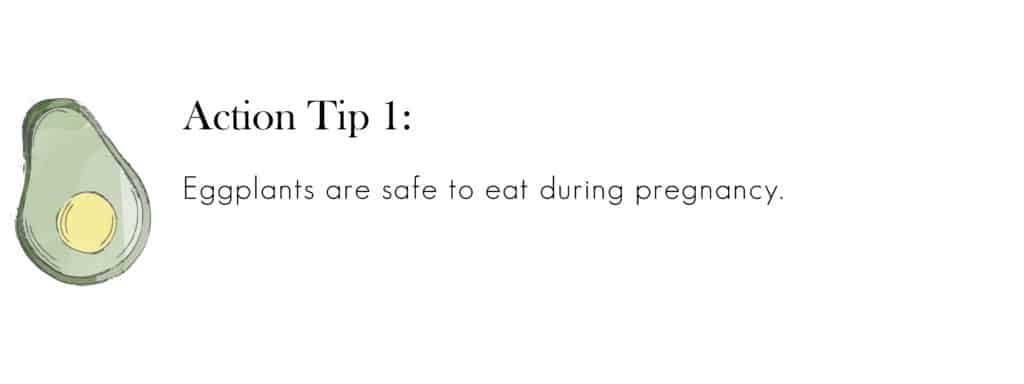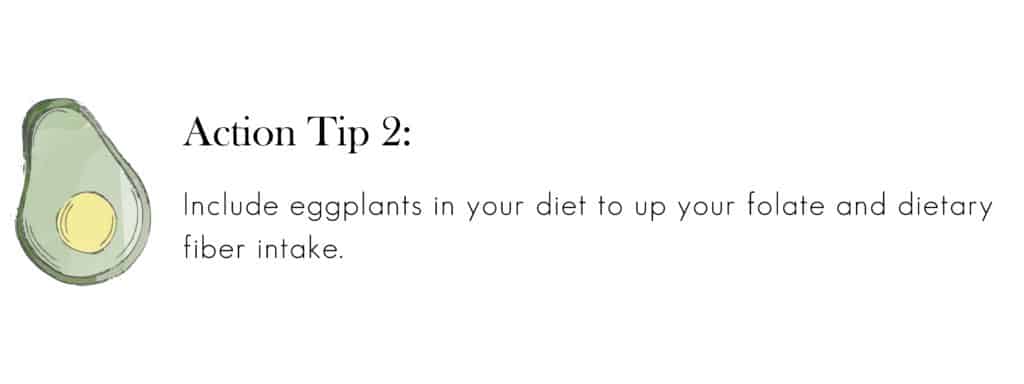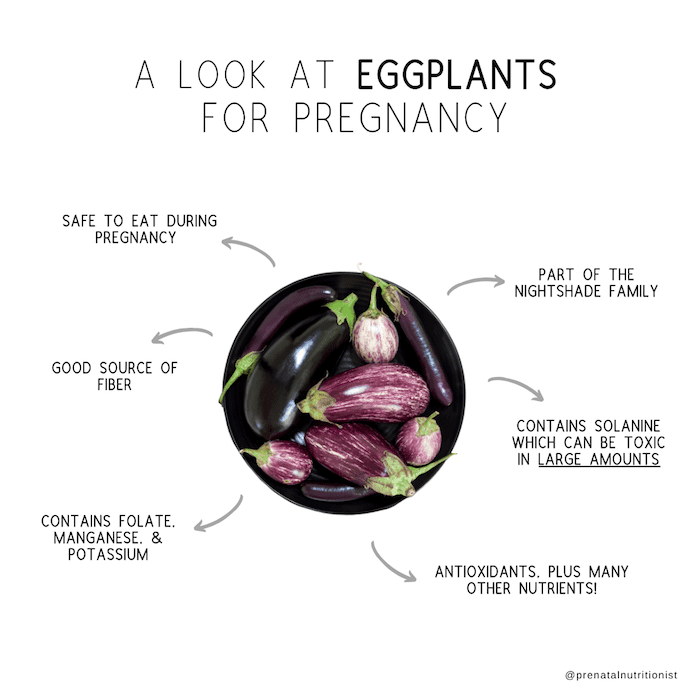Eggplants during pregnancy
If you follow a Mediterranean style diet (or enjoy eggplants), you may be wondering if you can enjoy eggplants during pregnancy.
This big purple squash is classified as a “nightshade”, a group of over 2,000 plants, although few of them are actually eaten. Some other nightshades include tomatoes, potatoes, and peppers.
You may have heard eggplants are dangerous to consume during pregnancy, but is this true?
Below we will take a look at the safety of eggplants while pregnant and also, the nutrients they provide for you and your growing baby.
Is eggplant safe during pregnancy?
Yes, eggplants are safe to eat during pregnancy. However, in this case, you can get too much of a good thing.
 Nightshades such as eggplants contain a substance called solanine which can be poisonous if consumed in high quantities.
Nightshades such as eggplants contain a substance called solanine which can be poisonous if consumed in high quantities.
Solanine
Have your potatoes ever turned green?
This green color is essentially a warning that the solanine in the potatoes may be at a toxic level. Eggplants don’t come with a warning, but you would have to try really hard to overdo it.
Solanine poisoning occurs when you are exposed to high levels of solanine and can cause symptoms such as diarrhea, vomiting, fever, and/or stomach pains.
You would need to eat over 400 mg of solanine for it to be poisonous and most nightshade vegetables contain anywhere from 2-13 mg of solanine (1).
So, unless your cravings are very strong, you will be just fine indulging in that eggplant parm from your favorite Italian restaurant.
Eggplant nutrition breakdown
1 cup or 82 grams raw, eggplant (2)
Calories: 20.5 calories
Carbohydrates: 4.8 g
Sugar: 2.9 g
Protein: 0.8 g
Fat: 0.2 g
Fiber: 2.5 g
Manganese: 0.2 mg
Folate: 18 μg
Potassium: 188 mg
Benefits of eggplant during pregnancy
Antioxidant properties
You may have heard this fancy word before but what is an antioxidant and why do I want it in my diet?
Antioxidants are substances that help protect the body from free radicals or harmful substances that may be floating around. Antioxidants are helpful in the prevention of chronic diseases such as heart disease and cancer (3).
More specifically, eggplants contain anthocyanins, the antioxidant that is responsible for eggplants bright and vibrant purple color (4).
Fiber
As you read above, 1 cup of raw eggplant contains 2.5 g of fiber.
Increasing fiber intake along with fluid intake is the first line of treatment for constipation during pregnancy, but fiber has many other functions other than to keep you “regular” (5).
Fiber helps keep you full longer and slows the rate at which your blood sugar rises, truly a win, win, win.
 Folate
Folate
Eggplants contain folate, a nutrient vital for the growth and development of your baby. Inadequate folate intake has been linked to several poor pregnancy outcomes (6).
Even 20 years after the US required folic acid fortification in grain-based products, around 20% of women are still deficient (7). Adding more high folate foods to your diet pre-pregnancy and during pregnancy is wise.
Manganese
Manganese is one of the least studied micronutrients when it comes to pregnancy. Although you are unlikely to be deficient, it is still important to consume the recommended amount as both deficiency and excessive consumption can lead to negative outcomes (8).
Two studies found that both low levels and high levels of manganese during pregnancy correlated to low birth weight in offspring (9, 10).

How to include eggplant in your diet
Eggplants are a versatile ingredient. While opting for “low-calorie” food finds is generally not recommended during pregnancy, if you find yourself in a situation where you are gaining too much weight too quickly, this is a great addition to any meal.
Here are some recipe and meal ideas to incorporate eggplant into your meals:
- Eggplant parmesan
- Eggplant lasagna
- Marinated teriyaki eggplant
- Eggplant pizza
- Eggplant fries
- Eggplant “BLT”
- Roasted eggplant

The Bottom Line
- While you can eat too much eggplant, a daily serving of eggplant will not harm you or your baby during pregnancy.
- Not only is consuming eggplant during pregnancy completely safe, but it also comes with benefits!
- Eggplant provides fiber, folate, manganese, and antioxidants, amongst other nutrients important for you and baby during this time.
By Lauren Gannon, RDN and Ryann Kipping, MPH,RDN, CLEC | Owner & Founder


